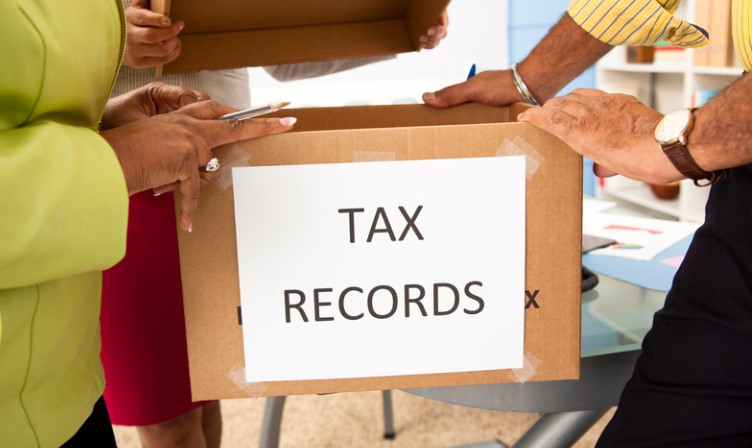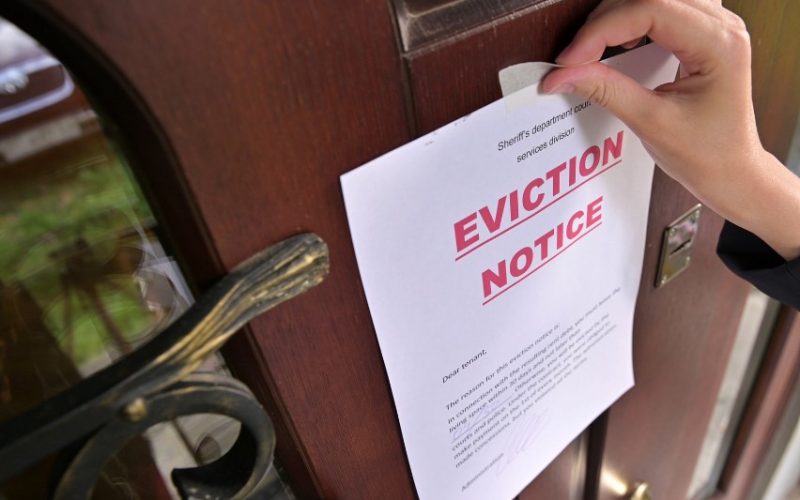Tax season is upon us, and while it may not be the most exciting time of year, it’s essential to stay organized regarding your income tax records. But how long do you need to keep those pesky receipts and statements? In Canada, there are specific guidelines for how long you should hold onto these records. In this blog post, we’ll break down exactly what needs to be kept and for how long.
Plus, we’ll give you some best practices for keeping your records organized so that come tax time each year, you’re ready to go! So sit back, grab a cup of coffee (or tea!), and let’s dive into the world of Canadian income tax record-keeping!
How Long Are You Need to Keep Tax Records in Canada?
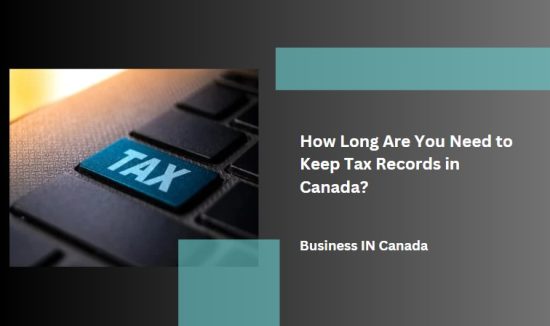
In Canada, keeping a record of your income tax for at least six years is important. This includes supporting documentation like receipts and statements you used to prepare your taxes. This is because the Canadian Revenue Agency (CRA) can ask to see these records within that time frame if they decide to audit you or re-assess one of your past returns.
It may seem tedious, but keeping track of all these documents is essential. It ensures that you have everything on hand if the CRA does request an audit. Plus, it can help you catch errors or discrepancies in your tax return before submitting them.
If you’re wondering when exactly those six years start – it’s from the end of the taxation year to which they relate. For example, if you filed your 2022 income tax return by the April 30th deadline in 2023, those records would need to be kept until December 31st, 2028.
Exceptions exist where certain situations require retaining records for more than six years; we’ll dive deeper into those later in this post!
What Are Included in Income Tax Records?
When it comes to income tax records, it’s essential to keep track of all the relevant information. This includes your T4 slips, which show how much you earned from an employer throughout the year, as well as any other sources of income such as rental properties or investments.
In addition to your income sources, you’ll also need to keep a record of your deductions and tax credits. Deductions can include RRSP contributions or childcare expenses, while credits may include medical expenses or donations made to charity.
Capital gains and investment losses documentation is another key component of income tax records. These records should detail the purchase and sale prices for each investment sold during the year.
Self-employed individuals must maintain detailed records of their business-related expenses to claim them on their taxes. This could include receipts for office supplies, travel expenses, or marketing costs.
Keeping thorough and organized records is crucial when it comes time to file your taxes – it ensures accuracy and can also help minimize stress during a stressful process!
Why Should I Keep a Record of My Income Taxes?
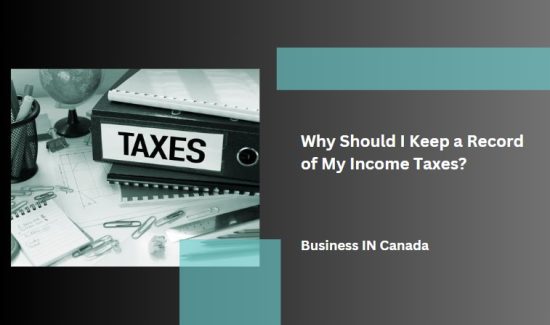
Keeping accurate and organized income tax records is crucial for several reasons. First and foremost, it ensures that you are in compliance with the law. The Canadian Revenue Agency (CRA) requires taxpayers to keep their tax records for a specified period, typically six years from the end of the taxation year.
Moreover, keeping track of your income taxes can help you identify any errors or discrepancies on your returns before they cause significant problems. This way, you can rectify them promptly and avoid penalties or legal issues that could arise from inaccurate reporting.
Another reason why it’s essential to keep a record of your income taxes is that it helps you plan for future filings accurately. Tracking all relevant documents, such as receipts, bills, invoices, and bank statements related to expenses and deductions claimed in previous years, will make filing future returns easier without missing out on eligible benefits.
Maintaining proper tax records also helps if there are changes in personal circumstances like marriage or divorce since this may affect how much one owes to CRA at month-end. Having these numbers ready beforehand makes everything more straightforward and faster once updated forms arrive in mailboxes each year.
After Six Years, Can I Get Rid of My Income Tax Records?
Once you have kept your income tax records for the required six-year period, you may think it is safe to dispose of them. However, there are a few things to consider before shredding those old documents.
Firstly, some financial institutions or government agencies may require proof of income from previous years during loan applications or other processes. In such cases, having access to older tax records can save time and hassle.
Additionally, keeping your income tax records beyond the minimum six-year requirement can be beneficial if you ever need to amend a previously filed return. The Canada Revenue Agency (CRA) allows taxpayers to make changes up to 10 years after the original filing date.
Holding onto certain receipts and supporting documentation beyond six years can help reduce capital gains taxes when selling assets in the future.
While disposing of old tax records after six years may seem like an easy solution for decluttering your space, it is often wise to keep them on hand for potential future needs.
Exceptions to the 6-year Rule
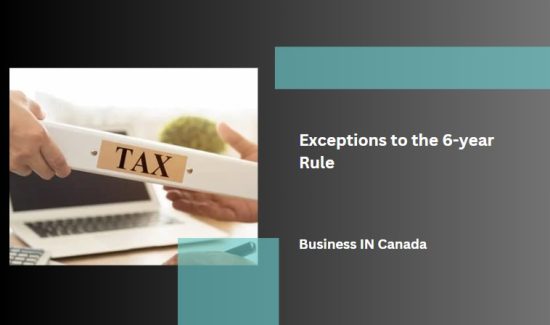
While the general rule for keeping tax records in Canada is six years, there are exceptions that taxpayers need to know. The most notable exception is when a taxpayer fails to report income from a foreign source. In such cases, the CRA can go back as far as ten years to assess taxes owed.
Another exception applies to property owners who claim capital cost allowance (CCA) on their tax returns. CCA allows taxpayers to deduct the cost of depreciable assets over time. If you sell a property and claim CCA on it, you must keep your records for ten years after disposing of the asset.
In addition, if you have outstanding debts with the CRA or are subject to an audit or review, it’s wise to keep all relevant tax records indefinitely until these issues are resolved.
It’s essential to keep accurate and complete records and ensure they’re accessible and well-organized should questions arise down the road. By adhering strictly to record retention guidelines mandated by law – six years in most cases – Canadians can protect themselves from potentially costly consequences of non-compliance with CRA policies and regulations.
Best Practices to Keep Your Records Organized
Keeping your income tax records organized is essential for ensuring that you can easily access and provide them when needed. Here are some best practices to keep your records organized:
- First, create a designated space to store all your income tax-related documents. This could be a filing cabinet or folder specifically for this purpose
- Next, label each document clearly with the corresponding year and type of document (e.g., T4 slip, RRSP contribution receipt)
- It’s also important to make digital copies of all physical documents in case they get lost or damaged. You can save digital copies by using online storage solutions like Google Drive or Dropbox
- To stay on top of things throughout the year, consider keeping a logbook or calendar where you record any relevant financial transactions as they occur
- Make sure to review and purge any unnecessary documents regularly. This will help prevent clutter and ensure that you’re only keeping what’s necessary
By following these best practices, you’ll be able to keep your income tax records well-organized and easily accessible when needed.
What Records Must Be Kept for 10 Years?
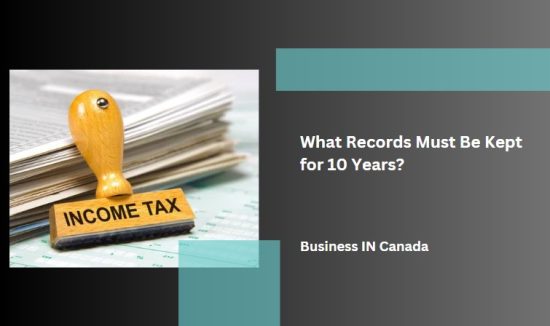
In Canada, there are certain tax records that must be kept for a longer period of time than the general six-year rule. These records include the following:
Property Records
Keeping all purchase and sale documents and any receipts for improvements is essential if you own property. This information is necessary in case you sell or transfer ownership of rental property.
Business Tax Records
If you have a business, you’ll need to keep all business-related tax records for ten years after the end of the taxation year they relate to. This includes invoices, receipts, bank statements and other financial documents.
Trust Documents
Trusts require additional record-keeping requirements due to their complex nature. Trustees must keep trust ledgers and supporting documentation for ten years following the termination of the trust.
It’s important to note that failure to keep these records can result in penalties from CRA audits or legal implications if accurate information cannot be provided when required. Keeping organized and up-to-date tax records is essential for staying compliant with Canadian tax laws and avoiding potential issues down the road.
Conclusion
After considering all the information presented, it is clear that keeping accurate records of your income taxes is crucial in Canada. Not only does it allow for easier tax filing and potential refunds, but it also protects you in case of an audit or review by the CRA.
Knowing how long to keep tax records can be confusing, but six years is generally the standard timeframe for most documents. However, there are exceptions to this rule, such as when dealing with capital assets or if there is fraud involved.
To ensure that you stay organized and meet the requirements, it’s best to have a system in place for record-keeping. This can include using digital tools such as spreadsheets or cloud storage services.
FAQ – How Long Are You Need to Keep Tax Records in Canada?

Can the CRA go back more than 10 years?
When it comes to tax records, the Canada Revenue Agency (CRA) has a standard six-year rule for keeping them. However, there are instances where the CRA can go back further than ten years.
One of these instances is if they suspect fraud or intentional misrepresentation on your part. If this happens, the CRA can go back as far as they need to in order to investigate and assess any unpaid taxes.
Another instance where the CRA may go back more than ten years is if you have unreported foreign income. In this case, they can go back up to 20 years under certain circumstances.
It’s important to note that while these situations are uncommon, it’s always best practice to keep accurate and detailed tax records for as long as possible. This not only helps with potential future audits but also ensures you have all the necessary information should you need it for personal reasons such as applying for a mortgage or payday loan.
In short, while most taxpayers won’t need to worry about the CRA going back more than 10 years on their tax filings, keeping good records is still crucial in case an exception arises.
What records must be kept for six years?
In Canada, taxpayers are required to keep their income tax records for a minimum of six years. These records include all necessary documents and receipts related to filing a tax return.
The six-year rule applies to individuals, businesses, and corporations that file taxes in Canada. This rule is because the Canada Revenue Agency (CRA) may conduct an audit or review within six years from the original assessment date.
Records that should be kept for at least six years include:
- T4 slips
- Investment statements
- Charitable donation receipts
- Medical expense receipts
- Business expense receipts
- Rental property income and expenses documentation
- Information on additional relevant income and deductions
As technology advances, many taxpayers choose to keep digital copies of their tax records instead of physical ones. However, it’s important to ensure these electronic versions are properly stored and easily accessible if needed by CRA during an audit or review.
Remember that failure to keep proper tax records can result in penalties or fines imposed by CRA. Therefore, Canadians who file taxes regularly – whether individuals or businesses -must maintain accurate financial documentation for at least six years after filing each year’s returns.
How can I avoid inheritance tax in Canada?
In Canada, there is no inheritance tax. However, when someone passes away, their estate may be subject to a final tax return and the payment of any outstanding taxes owed. The executor or administrator of the estate is responsible for filing this tax return.
One way to minimize the amount of taxes owed by an estate is through careful planning. This can include creating a will and establishing trusts that can help transfer assets without incurring unnecessary taxes.
Another strategy is making gifts during one’s lifetime instead of leaving everything as an inheritance. Gifts are generally not subject to taxation if they are given at least three years before the donor’s death.
It’s also important to regularly review your financial situation with a professional advisor who can guide you on how best to structure your assets and investments to reduce potential tax liabilities upon your passing.
While it’s impossible to avoid altogether all taxes related to an individual’s passing, proactive planning can significantly lessen any potential burden on loved ones left behind.
Does the CRA check every tax return?
The CRA only examines some of the tax returns that it receives. However, it uses various risk assessment tools to identify returns at higher risk for non-compliance with Canadian tax laws.
If your tax return contains errors or inconsistencies, there’s a higher chance that the CRA will review it more closely. This includes missing information, incorrect calculations, excessive deductions or credits claimed compared to your income level, or other red flags.
Moreover, if you’re selected for an audit by the CRA, they’ll likely review all of your previous tax returns and any related documents and records. Therefore, maintaining accurate and up-to-date records can help you avoid potential penalties and fines in case of an audit.
In summary, while the CRA doesn’t check every single tax return that it receives in detail; however if your return has errors or inconsistencies, there’s a high likelihood of being audited by the agency in future, which is why one must maintain accurate record-keeping practices at all times.
What happens if you don’t file taxes with CRA?
In summary, it is important to keep your tax records for at least six years after the date of filing. This includes all relevant information related to your income tax returns, such as receipts, invoices, and statements. However, there are some exceptions that may require you to keep records for longer periods of time.
Keeping accurate and organized tax records ensures compliance with the law and helps in case of any future audits or disputes with the CRA. It’s always best practice to stay on top of your record-keeping by adopting a systematic approach.
Failing to file taxes with CRA can lead to serious consequences like penalties and interest charges on unpaid amounts. If you continue failing to file or pay taxes owed, more serious legal action may be taken against you, including garnishing wages or seizing assets.
So take your time with filing taxes and keeping proper records – make sure you stay up-to-date on all relevant requirements!




